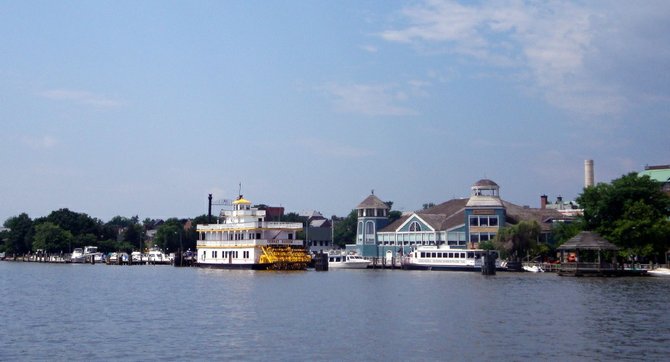The waterfront plan increases density at three sites and allows hotels. Photo courtesy of the Waterfront Plan Work Group
The first rule in politics is knowing how to count. By almost any standard, that means that a controversial proposal to allow hotels and increase density at three properties on the waterfront is likely headed for approval. Five out of seven City Council members have already indicated that are likely to support some form of the plan when the final votes are cast on Jan. 21. But opponents say they will be spending the upcoming weeks trying to gather enough signatures to force a supermajority of seven votes.
"This is probably the most important vote since urban renewal," said Boyd Walker, co-chairman of Citizens for An Alternative Waterfront Plan. "It will change the landscape of Alexandria, and so there should be a higher standard."
"This is probably the most important vote since urban renewal."
— Boyd Walker, co-chairman of Citizens for An Alternative Waterfront Plan
Currently, the whip count is a bit unresolved. Mayor Bill Euille is one of the chief advocates for the plan, as are Vice Mayor Kerry Donley and Councilman Paul Smedberg. After his unsuccessful campaign for the Virginia state Senate last year, Councilman Rob Krupicka also announced his support for the proposal. So far, the only member to indicate she will likely vote against the plan is Councilwoman Alicia Hughes, expressing concerns about the use of eminent domain against the Old Dominion Boat Club to acquire land at the foot of King Street.
"I just can’t support a plan that says we should set aside land that’s currently private property for use as a public park," said Hughes. "It’s possible that some kind of compromise will emerge, but that hasn’t happened yet."
Councilman Frank Fannon is conflicted between his support for the Old Dominion Boat Club, where he is a member, and his loyalty to the business community, which is strongly in favor of the plan. So far, he said, he has yet to make up his mind. That leaves Councilwoman Del Pepper as a wild card. At an Alexandria Democratic Committee meeting Monday night, she indicated that she might be willing to vote for the plan if certain amendments were added. When asked by a reporter what kind of amendments, the longtime councilwoman wasn’t forthcoming.
"None of your business," Pepper said and headed for the exit.
"There’s an opportunity for leadership here."
— Paul Smedberg
OVER THE COURSE of the last year, the debate on the waterfront plan has gone from heated to hostile to downright rude. Now, with the final vote only days away, tensions are mounting as each side makes its final pitch. Opponents are planning a rally members are calling "Take Back the Waterfront," for Jan. 11, the day of the final vote. Supporters have organized a series of meetings to mobilize speakers for the final public hearing on the issue, which is likely to be one of the longest in recent memory. During a work session on Tuesday afternoon, Mayor Bill Euille joked that the Army museum at Fort Belvior has been in the works since 1814.
"I hope we don’t take that much time to make a final decision," said the mayor, breaking the tension in a packed council chamber.
As council members digested the recommendations of a work group that submitted recommendations late last year, the outlines of a final version of the plan came into view. City planners say it will take about 25 years for the plan to pay for itself, eventually adding $1.1 million of new revenue each year to the city’s coffers. Councilman Krupicka suggested that the money be set aside in a lockbox so that it could not be used for other projects in different parts of the city. He also agreed with a work group recommendation that a separate entity such as a not-for-profit organization be created to help implement the plan.
"I think we have a spotty record" with implementation, Krupicka said during the work session.
Hughes said she was concerned that the plan may have what she called "hidden costs" for implementation because an environmental impact study has yet to be conducted, and at least one of the formerly industrial sites is known to have potential problems. City planners said they have created what they call "planning-level cost estimates," and expressed confidence that they have accounted for an "order of magnitude" for costs associated with the plan.
"There’s an opportunity for leadership here," said Smedberg at the end of the work session. "For the community’s sake, hopefully we can come to some resolution."
